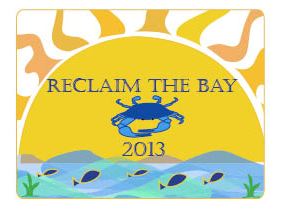Whether we live near the water or miles from it, our everyday actions have a profound effect on our local water quality and the Chesapeake Bay. The University of Maryland Center for Environmental Science has joined partners from state and federal agencies, non-profit organizations, academic institutions and advocacy groups to kickoff Maryland’s Reclaim the Bay public awareness effort.
 "We know why the Chesapeake Bay has become degraded and what we need to do to restore it," said UMCES president Dr. Don Boesch. "Now it's up to all of us to do what it takes to restore the Chesapeake Bay."
"We know why the Chesapeake Bay has become degraded and what we need to do to restore it," said UMCES president Dr. Don Boesch. "Now it's up to all of us to do what it takes to restore the Chesapeake Bay."
Maryland’s Reclaim the Bay campaign seeks to get Marylanders involved in Bay restoration efforts by sharing what they can do at home to help us reach 2025 pollution reduction goals. Simple activities such as recycling, stormwater management in our backyards and relying less on our personal vehicles to get around are just a few examples of easy changes everyone can make.
10 Things Marylanders Can Do To Reclaim the Bay
- Don’t Litter – Reduce the amount of trash that ends up in the Chesapeake Bay.
- Use Fertilizer Sparingly – Limit the amount of fertilizer used on your lawn and garden. Excessive levels of nutrients in the Bay lead to lower levels of oxygen needed for aquatic life.
- Build a Rain Garden or Rain Barrel – Stormwater carries pollutants such as lawn chemicals from our yards into the Bay. Creating backyard habitats can minimize runoff and reduce yard work.
- Scoop the Poop – Make your neighbors happy and keep harmful nitrogen out of the Bay by always cleaning up after your pet.
- Drive Less – More than one-third of the nitrogen pollution entering the Chesapeake Bay originates from air pollution. Consider carpooling, using public transportation, biking or walking whenever possible.
- Reduce Electricity - Coal-burning power plants are among the largest sources of nitrogen compounds in air pollution.
- Volunteer – Cleaning up the Bay begins in your hometown. Find a local watershed group and volunteer for a clean-up.
- Make an Appointment to Service Your Septic System – Septic systems should be inspected yearly to ensure proper functioning. Failing systems can leak into the groundwater and eventually end up in the Bay.
- Dispose Properly of Hazardous Household Items – Oils, anti-freeze, paint, cleaners and prescription drugs shouldn’t be poured down a household or storm drain. Check with your local waste management service to find out what hazardous materials they accept.
- Tell a Friend – Share one of these tips with a friend today and help us achieve our goal of Reclaiming the Bay.
Bay restoration is a work in progress that will take the cooperation of government and citizens to fully achieve by our 2025 goal. Learn what you can do to help restore the Bay.

